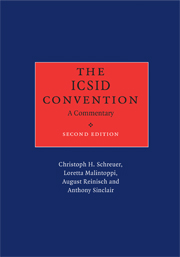Book contents
- Frontmatter
- Contents
- Foreword by Professor Sir Elihu Lauterpacht, CBE, QC
- Authors' preface to the second edition
- Table of cases
- List of abbreviations
- Text of the ICSID Convention
- Procedural calendar
- PREAMBLE
- CHAPTER I International Centre for Settlement of Investment Disputes
- CHAPTER II Jurisdiction of the Centre
- CHAPTER III Conciliation
- CHAPTER IV Arbitration
- CHAPTER V Replacement and Disqualification of Conciliators and Arbitrators
- CHAPTER VI Cost of Proceedings
- CHAPTER VII Place of Proceedings
- CHAPTER VIII Disputes between Contracting States
- CHAPTER IX Amendment
- CHAPTER X Final Provisions
- Article 67 Signature
- Article 68 Ratification and Entry into Force
- Article 69 Implementing Legislation
- Article 70 Territorial Application
- Article 71 Denunciation
- Article 72 Continuing Effect of Consent
- Article 73 Depositary
- Article 74 Registration
- Article 75 Notifications by Depositary
- Final Clause
- Consolidated bibliography
- Index by article
- Index by subject
Article 72 - Continuing Effect of Consent
from CHAPTER X - Final Provisions
Published online by Cambridge University Press: 07 September 2010
- Frontmatter
- Contents
- Foreword by Professor Sir Elihu Lauterpacht, CBE, QC
- Authors' preface to the second edition
- Table of cases
- List of abbreviations
- Text of the ICSID Convention
- Procedural calendar
- PREAMBLE
- CHAPTER I International Centre for Settlement of Investment Disputes
- CHAPTER II Jurisdiction of the Centre
- CHAPTER III Conciliation
- CHAPTER IV Arbitration
- CHAPTER V Replacement and Disqualification of Conciliators and Arbitrators
- CHAPTER VI Cost of Proceedings
- CHAPTER VII Place of Proceedings
- CHAPTER VIII Disputes between Contracting States
- CHAPTER IX Amendment
- CHAPTER X Final Provisions
- Article 67 Signature
- Article 68 Ratification and Entry into Force
- Article 69 Implementing Legislation
- Article 70 Territorial Application
- Article 71 Denunciation
- Article 72 Continuing Effect of Consent
- Article 73 Depositary
- Article 74 Registration
- Article 75 Notifications by Depositary
- Final Clause
- Consolidated bibliography
- Index by article
- Index by subject
Summary
INTERPRETATION
The idea underlying Art. 72 was reflected in the Preliminary Draft and all subsequent drafts to the Convention (History, Vol. I, p. 302). During the debates it was made clear that rights and obligations arising from existing consent to jurisdiction would be preserved (at pp. 536/7, 656). Mr. Broches explained that the intention of the article was to make it clear that if a State had consented to arbitration, the subsequent denunciation of the Convention by that State would not relieve it from its obligation to go to arbitration if a dispute arose. An arbitration clause in an agreement with the investor would remain valid for the duration of the agreement. With respect to a general declaration containing submission of claims to the Centre, Mr. Broches stated that it would not be binding until it had been accepted by an investor. If the State were to withdraw its unilateral statement by denouncing the Convention before it has been accepted by any investor, no investor could later bring a claim before the Centre. If, however, the unilateral offer of the State has been accepted before the denunciation of the Convention, disputes arising between the State and the investor after the date of denunciation would still be within the jurisdiction of the Centre (History, Vol. II, pp. 1009–1010).
- Type
- Chapter
- Information
- The ICSID ConventionA Commentary, pp. 1279 - 1282Publisher: Cambridge University PressPrint publication year: 2009



